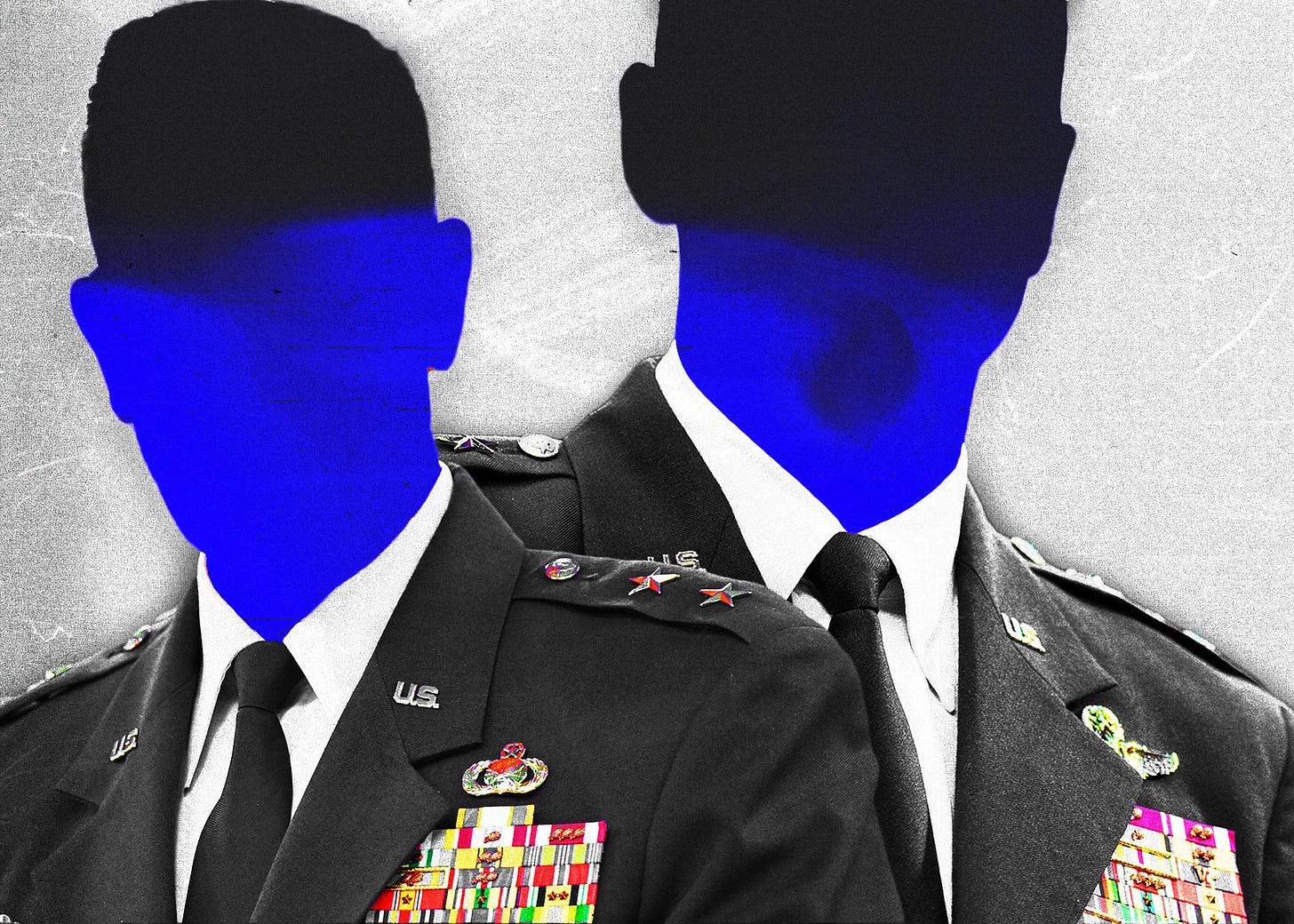Don’t Purge the Generals
History shows that political firings of military officers endanger national security.
HISTORY IS FILLED WITH LESSONS on the dangers of political leaders purging military officers for the wrong reasons, yet Secretary of Defense Pete Hegseth is reportedly preparing to fire a host of senior military officers that the Trump administration has deemed “woke,” starting with Chairman of the Joint Chiefs of Staff CQ Brown. [Update, February 21, 2025, 7:50 p.m. ET: Two hours after this article was published, Trump announced via social media the firing of Gen. Brown.]
Political interference in military leadership—especially dismissing generals and admirals based on ideological loyalty rather than competence—has repeatedly led to disastrous consequences. Whether driven by paranoia, sectarianism, or a desire for greater personal control, politically motivated purges have a history of weakening armies, undermining national security, and, in the worst cases, leading to battlefield defeat. While leadership overhauls are sometimes necessary, history shows that political “purges” often leave a country vulnerable to both external threats and internal instability.
I once observed the disastrous consequences of such a purge—not in America, but in Iraq. Lt. Gen. Riyadh Jalal Tawfiq was the commander of the Mosul Operations Command in 2008. A career Iraqi Army officer, Riyadh was a professional soldier, dedicated both to his country and his troops. As a young officer, he had fought in the Iran-Iraq War and later commanded a tank unit against U.S. forces during Operation Desert Storm in 1991—not because he was a Saddam loyalist, but because he was an Iraqi patriot. I met him in 2007, when he was selected to lead several divisions of Iraqi troops during a critical period in the fight against insurgents. He was my Iraqi counterpart for almost a year, and I observed him firsthand in tough combat situations. His soldiers respected him for leading from the front. He was also a solid tactician, crafting an effective plan to rid Mosul of terrorists and insurgents, and he worked to unify his force despite Iraq’s deep sectarian and tribal divisions.
Yet, despite his skill and leadership, Prime Minister Nouri al-Maliki suddenly removed him from command in 2008 in the middle of a fight. Shocked by the decision, I pleaded directly with Maliki to keep Riyadh in place, but my argument didn’t change the prime minister’s mind. I soon learned from my superiors that Maliki, a Shia leader, was consolidating control over the military, removing officers he suspected of disloyalty—or of challenging his popularity. This was the beginning of a broader purge, as Maliki replaced competent battlefield leaders with politically loyal but inexperienced Shia officers. Over the course of years, Maliki’s actions severely weakened the Iraqi Army, particularly in Sunni-majority areas like Mosul.
Security in Mosul remained fragile, and insurgents continued to operate in the region. Maliki’s increasing politicization of military leadership ultimately contributed to the collapse of the Iraqi Army in 2014, when ISIS overran Mosul and the Sunni provinces with little resistance. His purge serves as a stark warning of what happens when military effectiveness is subordinated to political control—a lesson with implications far beyond Iraq.
History is replete with examples of politically motivated military purges leading to catastrophic consequences. Desperate for total control of the Red Army, Joseph Stalin executed or imprisoned thousands of experienced officers, including three out of five marshals and most of his senior command staff starting in 1937. The result was a drastically weakened Soviet military and disastrous failures early in WWII. Some, like Marshal Kirill Meretskov, were arrested only to be released and placed back in command when the military was desperate for competent officers.
Saddam Hussein repeatedly purged his military leadership throughout his 24 years in power, prioritizing personal loyalty over competence. His forces suffered heavy losses in the Iran-Iraq War, collapsed in the Gulf War despite being the fourth-largest army in the world, and proved utterly incapable of resisting the 2003 U.S.-led invasion.
THERE ARE TIMES when military leadership overhauls have been necessary for practical reasons and have yielded positive outcomes. Lincoln repeatedly fired incompetent Union generals during the Civil War, ultimately placing Ulysses Grant and William Tecumseh Sherman in command. President Franklin Roosevelt replaced aging officers with younger, more dynamic leaders to prepare the United States for World War II, and repeatedly replaced commanders or leapfrogged junior officers to senior roles, including Gen. Dwight Eisenhower and Adm. Chester Nimitz. Kemal Atatürk gradually replaced Ottoman-era officers to modernize Turkey’s military, and Charles de Gaulle meticulously removed Nazi collaborators from the French military to restore its credibility after World War II. These national leaders didn’t make their decisions based on a desire for personal control of the military or based on what party or faction they thought the officers preferred. Their actions were driven not by paranoia, sudden impulse, or a demand of political loyalty but by strategic necessity and a commitment to military effectiveness.
When done strategically—replacing ineffective or older leaders with more capable ones based on merit—restructuring can be productive. But when driven by political loyalty, ideological purity, or paranoia, replacing generals can weaken command structures, reduce battlefield effectiveness, and even lead to national security disasters. The lesson from history is clear: competence, not politics, should determine who leads a nation’s military.
THE ACCUSATIONS OF “WOKENESS” against American officers are often vague and politically charged, with little connection to an officer’s actual ability to lead troops or win battles. Military leaders are responsible for preparing forces to fight and win wars, not for engaging in partisan politics. Decisions regarding training, personnel policies, and leadership development are made by those leading the force based on operational needs and effectiveness, not ideological preferences. Removing officers for perceived ideologies rather than performance undermines the merit-based system that is a cornerstone of U.S. military excellence and violates the norms of a democratic society’s ethos of proper civil-military relationship.
If the political leadership of the military—the president and the secretary of defense—want to change the policies of the military, they can issue orders to those who command the force. It is the responsibility of the civilians at the top of the chain of command, not those in uniform, to provide legal and understandable guidance for the military to execute.
Senior military leaders must be held accountable for poor performance or ethical failings—and they are. General officers are not interchangeable bureaucrats, and by the time they have been chosen to wear four stars they are products of decades of training, education, and operational experience and they should not be replaced without significant cause. Unlike in the business world, where a CEO can often be fired and then replaced with relative ease, military command relies on an officer’s deep institutional knowledge, strategic acumen, and leadership credibility built over decades. Removing top commanders arbitrarily weakens the command structure, disrupts continuity in military planning and operations, and harms morale. All that could potentially lead to a national security failure during a crisis.
Those chosen to wear four stars have accumulated extensive experience across a variety of assignments, usually with multiple deployments to combat zones, command at increasing levels of responsibility, and time in joint or combined operations. Success throughout a career in these roles demands adaptability, brains, emotional intelligence, and the ability to lead large, diverse forces under pressure. Most senior officers also have experience at the Pentagon, within major combatant commands, or in multinational assignments, where they gain exposure to high-level strategy, diplomacy, and interagency coordination.
Even with an impeccable record, those promoted to four-star rank require nomination by the president and confirmation by the Senate. A small fraction of officers reach this level, and those who do demonstrate both battlefield leadership as well as political and strategic foresight. They have the education, experience and savvy to advise civilian leadership, shape military doctrine, and command large-scale operations with global implications. Their journey is one of perseverance, intellectual rigor, and unyielding commitment to their nation’s defense—qualities that make their removal for purely political reasons not only a loss of experience but a threat to the institution and the nation they serve.
Senior officers don’t always succeed. One of the hardest jobs of the civilian leadership is finding the right commander for the right fight at the right time, which presidents like Lincoln, Wilson, and Roosevelt managed to do. But the right officer for any fight should not be chosen for their partisan loyalty.
Military purges, when driven by politics rather than performance, almost always weaken a nation. A strong, independent, and professional military with nonpartisan leadership is not just an asset—it is a necessity for national security.






